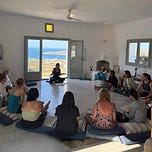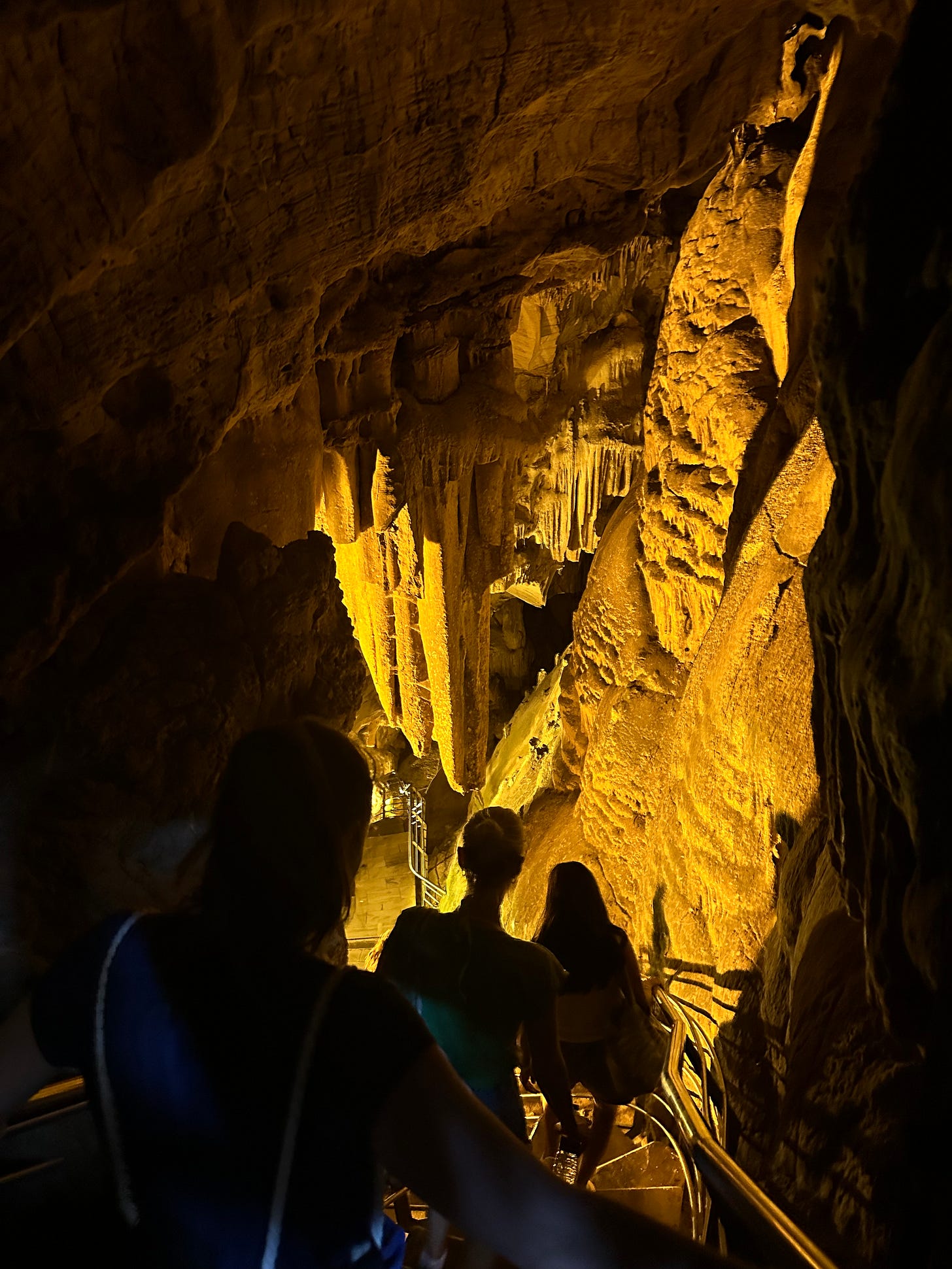If you look at the shape of a good myth - or really any good story worth its salt - you’ll find a rhythm that echoes across time and culture. The Descent. The Ordeal. The Return. The Gift. It’s the arc of transformation, and we’ve seen it everywhere: from Homer to Hollywood, from ancient epic to personal breakdown. And this is what we investigated this past week on my MYTHOS retreat in Greece (thanks to Fykiada Retreats!), an ancestral home of Western mythology.
*(I recommend the audio track for this post, because in it, the poem included here is teased apart in ways that it can’t be over text, if that’s of interest to you.)
And if we are honest about where we are right now, as a culture, as a species, as individuals living in this moment, it’s clear we are not at the triumphant ending. We are not at the resolution where the protagonist ascends from the underworld bringing with her gifts from beyond. No. We are in Stage 1: The Descent. Not as metaphor, but as lived experience. The headlines alone tell us: systems are collapsing, wars are accelerating, meaning is fracturing, and the old maps no longer match the terrain.
But what I find merciful about looking at our times in the context of the arcs that have come long before us, the descent doesn’t mean that all is lost. In every myth, the descent begins when the known world collapses, when something breaks, and there’s no going back. What immediately follows is not clarity, but complete disorientation. A plunge into grief, into chaos, into the parts of self or society that can no longer be upheld.
So the question is not “Are we in the descent?” We are. The real question is: “How will we meet it?”
Well, first of all, there is no part of any worthy myth where the protagonist “scrolls past” the descent. But unbelievable, that’s a possibility for us in these times. It’s one of the many impulses and coping mechanisms available to us, along with overwhelm, numbing out, and fracturing. And it makes sense - because…
Our nervous systems weren’t designed to toggle between images of missile strikes and skincare tips.
(Read that again!) We’re being asked to absorb impossible amounts of devastation through a screen built for distraction. It’s not weakness to feel frayed. It’s a very human response to that which is completely inhumane, being consumed at an inhuman pace.
But the danger isn’t just exposure. It’s dismemberment. The soul isn’t meant to take in this much, this fast, with no space or place to process, no ceremony to metabolize it, no relational ground to re-member what matters. The scroll not only toxically normalizes today’s horror but it also serves as a portal that leads us away from descent. And yet, going through with the descent is the only way real change has a chance to begin.
To stay in the descent, to face the disorientation without collapsing or escaping it, requires practice. Courage. Ground. And presence. The kind that doesn’t flinch from the pain, but doesn’t become it either. The kind that can hold paradox without turning it into performance. This is why the old myths matter. They weren’t written to entertain. They were designed to guide people through moments just like this—when the ground falls away, when this body (individual and collective) is deep in its shake,
when the world begins to crack and you don’t yet know what might fall through - or grow - in the space between.
Author Bayo Akomolafe writes, “(this) is descent. It is staying with the broken, composting the unbearable, and letting grief ferment into forms of knowing the rationalities and modern logics of agency cannot hold.” I had to read that one a few times… In my own words, true transformation doesn’t come from fixing or fleeing brokenness, but from staying with it, staying in the conversation long enough to be changed by it. Logic-based approach to solving problems can’t contain or explain this kind of deep knowing. Grief, spirit, suffering, transformation - these are felt truths, not solved equations. They exist beyond the reach of what we call “rational” or “productive.”
Bayo (my new favorite) goes on to say: “To call (this) a spiritual bypass is to mishear its frequency. This is not bypass. This is by-ground. This is spirit so entangled with matter that it weeps in the soil, sings through scar tissue, and dances in the ruin: not to transcend the pain, but to in-form it, to become-with the rot and bloom that the dominant gaze refuses to see. We are not climbing out of the world. We are going deeper into it, through its fractures, through its moist thresholds. That is not bypass. That is spiritual composting.”
Spiritual Composting.
(Pausing to let those words be the word & let the word work on us)
On retreat, we worked with a poem by Marie Howe called Prayer. Though she wrote it in 2008, it feels eerily attuned to now. In a time when war footage plays next to trending dance videos, and the sound of the garbage truck cuts through our private grieving, Howe doesn’t judge that fragmentation. She just names it. I really do wonder, is this poem the exact practice we need for these exact times of live-streaming atrocity?
Listen to this episode with a 7-day free trial
Subscribe to Make the Sun to listen to this post and get 7 days of free access to the full post archives.














